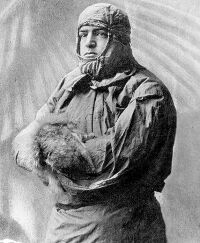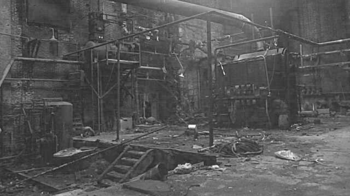Ernest Shackleton
Sir Ernest Henry Shackleton (15 February 1874 – 5 January 1922) was an Irish explorer, mostly remembered for not being Robert Falcon Scott and coming back alive from the South Pole.
Early life and career[edit]
Ernest was born to a humble Anglo-Irish family in Kilkea, County Kildare. At the age of two, Ernest became famous as the "Horseshoe Baby" for his ability to ingest and digest iron horseshoes. His family was offered a crap-load of money and sold Shackleton to a Welsh freak circus, where he would spend most of his adolescence. Ernest is believed to have broken free from his cage in 1842 after chewing through two meters of pure iron, heading off to pursue a dream career as an explorer. During his time at the circus he was blessed by a 90-year-old talking cockatoo, who said he had "sick plans for him". This is believed to be the origin of his immortality.
Escape from Britain and polar exploration[edit]
Around 1852, Ernest began working at a cheesecake factory in the suburbs of London so he could raise money for his balloon expedition around the world. A year after, Shackleton accidentally left a porno magazine on his working station, attracting many of the factory's married workers. The factory, left unmanaged for about fifteen minutes during the HIV-infested circlejerk, suffered a fatal flaw in one of its coal-powered furnaces, which lead up to its explosion and the consequent death of about 46 men.
Ernest quickly fled the country after being informed his idea was a ripoff of Jules Verne's books, settling in the new town of Portland, Oregon, away from any British jurisdiction. There he lay low, managing his own laundry company until hearing about the death of Robert Scott in Antarctica. Pissed off from the attention Scott was getting, he decided to set off for an expedition, and came within 180km from the South Pole before dying of starvation. Scott, not to be outdone, would become the first man to die twice in the Arctic. Shackleton's rage against Scott resurrected him, and he decided to set the record for most deaths in an antarctic expedition.
He ended up dying five times in the Arctic through ways such as:
- Crushing by his ship, the SS Endurance;
- Mauling by sled dogs;
- Starving to death.
Shackleton came back to Britain expecting a hero's welcoming like Scott's, but instead discovered that World War I had started and everyone had stopped giving a shit about his multiple deaths. Stubborn until the end, he travelled to South Georgia Island where he died a sixth time, this time from a heart attack, lying dead for nearly ninety years until his final appearance.
Seventh coming and involvement with Al-Qaeda[edit]
Ernest's apparent resuscitation skills amazed Osama Bin Laden, who attempted to bring Shackleton back to life in 1998, travelling to South Georgia Island to recover his corpse. Using a 20-foot long IKEA pencil, he brought the rotting corpse of Shackleton back to life through use of said pencil as a suppository.
Upon his awakening, Ernest was devoid of any memory of his past life, and played a minor role as a fighter for Al-Qaeda in Syria, gaining several decorations along the way. Ernest ended up receiving a fatal bullet wound to the left temple in 2000, resulting in his seventh and last recorded death until present days. His corpse was thrown to the Red Sea, where it is suspected it descended to the depths, laying in eternal slumber while healing from his bullet wound.
His corpse's current whereabouts are unknown.
A statue of a piece of cheesecake was built by an unknown artist and laid in Aleppo, Syria for four months reading "Ernest Shackleton: The Polar Turd". However, it was removed due to everybody's lack of knowledge about Ernest's life and for it being generally offensive to Muslim culture, well-known haters of cheesecake. It recently sold on amazon for £2.10 to a remote cult of personality to Ernest in Denmark known only as "The Shackleheads".
Awards and decorations[edit]
- Knight Bachelor
- Officer of the Order of the British Empire
- Officer of the Order of the Polar Bear for the Democratic Penguin's Republic of Antarctica
- One of Bin Laden's 72 Virgins
- 2nd place in the 1999 annual Saudi Arabia curry eating contest


